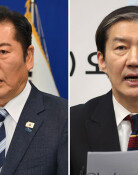Japan`s right-wing lashes out at Asahi report on sex slavery
Japan`s right-wing lashes out at Asahi report on sex slavery
Posted August. 07, 2014 03:58,
After the Japanese daily Asahi Shimbun`s report on errors in many articles on the wartime sex slavery issue involving the Japanese military, Japan`s right-wing politicians and media launched a general offensive on the newspaper to reverse the 1993 Kono statement that admitted its responsibility.
According to Japanese media reports on Wednesday, Shigeru Ishiba, the secretary general of Japan`s ruling Liberal Democratic Party (LDP) and a candidate for next prime minister, told reporters on Tuesday that the Diet may need to verify the Asahi articles in question. "The articles have affected regional peace and stability as well as our friendship with our neighbors and public sentiment. There may be a need for verification in the legislature. Unless we uncover the truth, we will not be able to build peace and friendship in the future," he said. As the remark suggested that the Diet may summon Asahi officials for questioning, raising the possibility of violating the freedom of the press.
Takeo Kawamura, an LDP lawmaker and secretary general of the Japan-Korea Parliamentarians` Union, also criticized Asahi for being "careless" and "guilty" of creating misunderstanding between Seoul and Tokyo.
Japan`s right-wing media also joined the offensive on Asahi. On Wednesday, the Sankei Shimbun editorially argued that Asahi`s retraction of its articles undermined the grounds for forceful mobilization of sex slaves that was admitted in the 1993 Kono Statement.
The Yomiuri Shimbun criticized that Asahi should have made the corrections earlier as its articles were some of the grounds that caused "wrong recognition" of Japan in the world as well as anti-Japanese sentiment in South Korea.
Eiji Oguma, a historian at Keio University, wrote in Asahi`s Wednesday edition that some Japanese conservatives argue Tokyo is not responsible for the sex slavery if there is no evidence of Japanese soldiers or government officials taking away women forcefully. However, he wrote, such a viewpoint matters only in Japan and sounds like an inconvenient excuse.
Yoshiaki Yoshimi, a professor of Japanese modern history at Chuo University in Tokyo, said that such an argument is not accepted in the international community at all. He added that a false account of the forceful mobilization does not affect the issue.
The Tokyo Shimbun opined that to summon journalists to parliamentary hearings is extremely unusual, expressing concern that such pressures on media organizations could encroach upon press freedom.



![[단독]이혜훈 “장남 다자녀로 연대 입학”…당시 그런 전형 없었다](https://dimg.donga.com/c/138/175/90/1/wps/NEWS/IMAGE/2026/01/23/133215083.1.jpg)
![하버드 의사가 실천하는 ‘뇌 노화 늦추는 6가지 습관’ [노화설계]](https://dimg.donga.com/c/138/175/90/1/wps/NEWS/IMAGE/2026/01/22/133210626.3.jpg)

![[단독]“5000만원씩 두 상자…윤영호 ‘王자 노리개 상자’ 권성동에 건네”](https://dimg.donga.com/c/138/175/90/1/wps/NEWS/IMAGE/2026/01/23/133215085.1.jpg)
